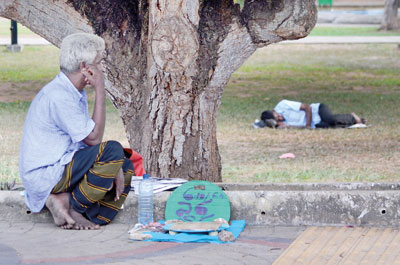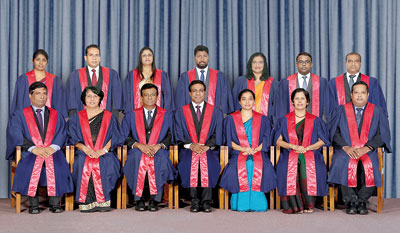Sunday Times 2
Geriatric care: Towards a happier and brighter silver age
Sri Lanka has one of the most rapidly aging populations in the world. At present, the over-60 population is 12.5 percent and is projected to increase to 25 percent in 2041. While it took 115 years in France and 85 years in Sweden for the population over 65 years to increase from 7 percent to 14 percent, this increase is predicted to occur in Sri Lanka in just 23 years. The rapid increase in the elderly population, however, is taking place without a major change in the infrastructure and per capita level of income. Thus, Sri Lanka will need a spectacular rate of economic growth to provide health-care services for this rapidly aging population.
In this context, the long-term care of the elderly will need the development of long-term care facilities in addition to the existing hospitals. It is difficult for the elderly to travel far for treatment; thus physiotherapy and other services need to be available at community level. Improving accessibility to such services through the development of community health services is needed, as also the location of rehabilitation institutions closer to their homes. They also need a social security mechanism which will ensure health care for them. No insurance policy covers the elderly, as the age limit for most policies is 55. Thus, financial constraints during old age make them dependent on their children who may already be having difficulties with expenses incurred by their own children. This burden could cause a strain on the relationship between children and their parents. As such, it is important to find a mechanism through which elders could be provided financial support.

A multidisciplinary approach is a necessity in managing the complex physical, social and psychological problems of the elderly.
At present, the long-term care of the elderly is mostly done by the extended family which is an asset. Patients are being discharged prematurely due to pressure of beds and high turnover in hospital wards, while time and space are not available for a patient needing rehabilitation in an acute medical ward. Thus, doctors are compelled to discharge patients when actually they are not ready to be taken home. Rehabilitation centres are few and there are no intermediate care facilities to look after patients until they are ready to go home. Therefore, at present, educating the informal care-givers in the extended family and strengthening them would be the best way of looking after the elderly as far as long-term care is concerned.
The elderly patient poses many challenges to the physician. The presentation of diseases in the elderly is non-specific; they have multiple non-communicable and degenerative diseases and are on multiple medications. The evolution of medicine has resulted in super specialisation with specialists dealing with different aspects of patient care. It is impossible for a physician to keep abreast of the vastly changing knowledge base of different specialties. However, the holistic approach which is vital especially in managing elderly patients can be achieved best through the multidisciplinary approach.
A multidisciplinary approach is a necessity in managing the complex physical, social and psychological problems of the elderly. The delivery of care by an interdisciplinary team consisting essentially of a geriatrician/physician, a nurse, a physiotherapist, an occupational therapist and a social worker is needed to provide a comprehensive package to the elderly. Other members such as a dietician, speech and language therapists, a podiatrist and a tissue viability nurse would be useful in the care of these elderly patients.
The assessment, management and follow-up of physical, mental and social problems of the elderly are called the comprehensive management of the elderly. Comprehensive Assessment, which is the gold standard, cannot be accomplished without the support of an interdisciplinary team.
The recently published National Survey on Self-reported Health in Sri Lanka comprises data throughout 2014 from 25,000 households covering all districts. It is the first household survey on health. A total of 55.2 percent of the respondents aged 60 years or older reported having at least one chronic disease. In respondents aged 65 years or older, 18.1 percent reported having diabetes; 30.4 percent hypertension; 6.6 percent asthma; and 8.8 percent arthritis. The National Survey on Elders 2003-2004 showed that 83.9 percent lived in rural areas; 12.3 percent in urban areas; and 3.8 percent in the estate sector. The survey also showed that 65 percent of the elderly had poor vision and 2 percent no vision, while 28 percent had poor hearing and 2 percent no hearing at all. Joint pains and difficulty in movement were the commonest illness among the elderly, according to this survey.
The Sri Lanka Association of Geriatric Medicine was initiated by a group of doctors interested in Geriatric Medicine in February 2014 under the guidance of Dr. Lalith Wijayaratne with the intention of developing geriatric care. The vision of the association is to ensure active and healthy aging in Sri Lanka, with the mission being to ensure the promotion of geriatric education among the medical fraternity and the public to facilitate the development of an elderly-friendly environment in health-care institutions and the community and to integrate elderly activities carried out by various organisations with the common goal of promoting good health and well-being among senior citizens.
Since the inception of the association, many activities have been carried out to enhance the knowledge of doctors in geriatric medicine and improve the quality of life of the elderly. Elders should maintain a healthy lifestyle and engage in exercise and have a healthy diet. It is important to have an adequate amount of protein in the diet as it is crucial to reduce muscle-wasting in old age. A low protein content in our diet leads to the loss of strength and muscle mass. This, in turn, leads to falls and fractures in the elderly, resulting in disability or death. Maintaining good physical and mental activity with participation in social activities is important to achieve active healthy aging and prevent dementia. The elderly need special care, love and empathy. We must bring about an elderly-friendly attitude in our hospitals, workplaces, homes and society. We are what we are because of the services rendered by our elderly. Thus, the term ‘old age’ should be replaced by the new term ‘silver age’ to give them dignity.
The activities of the Sri Lanka Association of Geriatric Medicine will enable the linking of all stakeholders working towards better elderly care in the country. It is our hope that all those working towards a better quality of life for the elderly will join hands to face the challenges of elderly care. The elderly need to be respected and their dignity ensured. We should build a society for all where the elderly will have equal rights and opportunities. After all, becoming old is inevitable and we should all do our best to make the silver age happier and brighter.
(The writer is the President of the Sri Lanka Association of Geriatric Medicine and a Consultant Physician attached to the Colombo South Teaching Hospital.)
 The Council of the Sri Lanka Association of Geriatric Medicine Annual academic sessions on Friday Dr Jayasundara Bandara, Director-General of Health Services, will be the Chief Guest and the Founder of the Association and Consultant Rheumatologist, Dr. Lalith Wijayaratne, the Guest-of-Honour at the inauguration of the session. The pre-congress workshop on Thursday (November 16) with the participation of doctors, nurses and allied health staff will demonstrate how an interdisciplinary team will assess and manage problems of the elderly. It was at the first annual academic session held in 2014 that the term ‘Silver Age’ (Rajatha Viya) was coined for old age, with its theme of ‘Towards the Silver Age with Dignity’. | |

